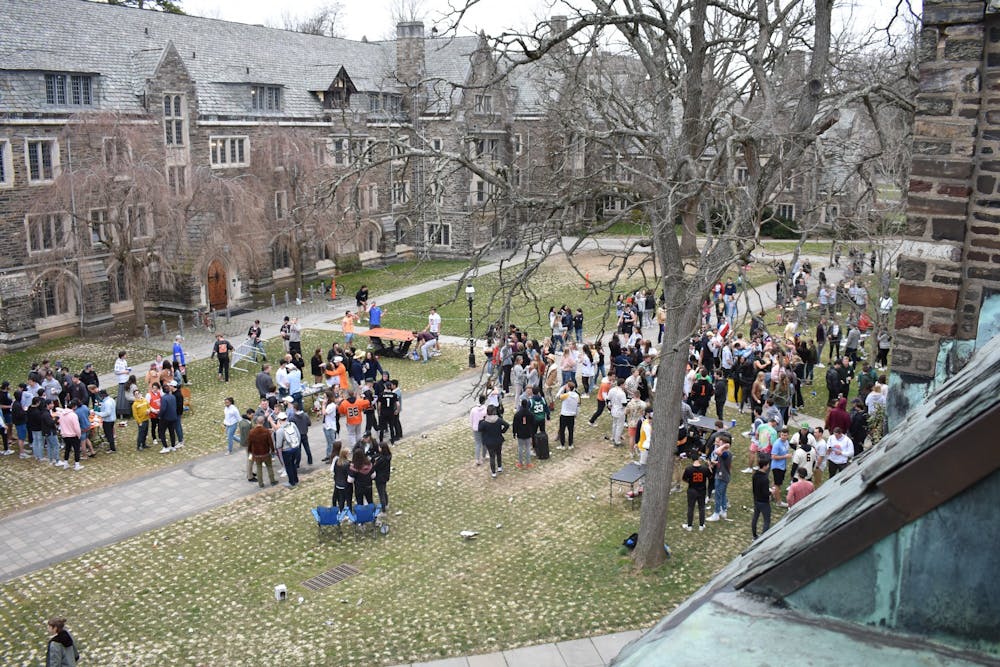To walk through campus during the first days of spring break meant trudging through hallways cluttered with filing cabinets, with textbooks, with furniture. Garbage cans overflowed in empty rooms. Mailboxes went unemptied. Food — in boxes, in bags, in basements — piled up and began to reek. Strewn everywhere was the evidence of college students forced out in a hurry.
Broken bottles, red Solo Cups, and dice littered Henry Courtyard, its pristine grass pockmarked by a horde of students’ feet and a slew of folding tables’ legs. Leaning against the side of Campbell Hall was a half-empty handle of Svedka vodka, a stack of plastic shot glasses, and a scribbled cardboard sign that read: “It’s the end of the world as we know it so you might as well take shots!”
Strewn everywhere was the evidence of college students forced out in a hurry — and determined to make the most of their last days on campus.
“Princeton students are motivated,” said Camille Reeves ’23. “Once something is in motion on this campus, it’s hard to stop it.” For many students, in what would have otherwise been an ordinary midterms week, that “something” wasn’t their exams.
After the March 11 announcement ordering almost all students to return home for the rest of the semester, members of the class of 2020 rushed to cram their senior spring traditions into their few remaining days.
Some preemptively marched through FitzRandolph Gate. Eating clubs held mock graduations for their seniors, handing out superlatives alongside mock diplomas. A cappella groups held final arch sings all over campus; senior members of the Wildcats, an all-women group, sang the tune they had first performed when joining the group.
“I needed closure,” said Laura Kirkland ’20, a Wildcats member. “It was hard to end the hardest four years of my life so abruptly without getting the celebratory moments at the end.”
Some seniors scrambled to check off a list of climactic Princeton traditions. Other students just tried to have a good time.

Midnight DJ party in Henry Courtyard? Check. Jump into Lake Carnegie? Check. Set off fireworks on Poe Field? Check. Set off fireworks above Wilson College? Check. Sneak into Baker Rink for a midnight free skate? Check, and check.
For students who partook in the campus-wide festivities, Thursday proved the biggest day of celebration. Some, like Elizabeth Evanko ’23, held makeshift birthday parties for friends whose birthdays would occur in the next few months. Others coped in less conventional ways: by egging Whitman’s courtyard, say, or by smashing bottles outside of Wu dining hall.
The student antics garnered a sizable response: the force of the University’s Department of Public Safety, or PSafe, on full display. Officers worked through the night to break up individual dorm parties and gaggles of students blatantly ignoring social distancing protocols. A midnight gathering on Poe Field was disrupted when patrol cars, headlights flashing, drove onto the field, sending students scattering into the night.
Administrators shared in PSafe’s frustration. In an email sent on Friday, March 13 and addressed to all students, Dean of Undergraduate Students Kathleen Deignan said she was “disheartened” to see so many students disregarding social distancing protocol and “engaging in disruptive behavior.”

Deignan reminded students of communication from President Christopher L. Eisgruber ’83, who had stressed the need “to reduce the number of instances where members of our community gathered in large groups and in close proximity to one another,” given the risk of a COVID-19 outbreak on campus.
Students found congregating in large gatherings, Deignan warned, could face serious consequences: documentation of wrongdoing, immediate campus eviction, and even arrest for disorderly conduct.
Warning and all, many students made it clear that they prioritized time with friends over following regimented campus health protocols. But some shared the administration’s disappointment in campus’ physical state and in students’ disrespect for the health of the community.
“It was heartbreaking to see how quickly people were ready to destroy campus,” said Reeves. “There’s a line between being emotional and wanting to throw trash everywhere.”
Kirkland noted that while she understood the source of students’ frustration and their desire to spend their last nights with friends, she still was upset by the number of large gatherings on Thursday night.
“We’re all making this big collective sacrifice,” she said. “And we have to go home now, and not stay here, because we are trying to keep each other safe. I felt like ‘why do we have to make this sacrifice if people are just going to disrespect it anyway?’”
The University is “taking drastic measures to prevent a spread of a deadly virus that all of you are ignoring to get wasted at 3pm,” read an anonymous post on the student Facebook page Tiger Confessions++. “Please stop being so selfish and ignorant.”
No matter whether they committed to that communal sacrifice or threw safety regulations out the window, interviewed students agreed on one count: their last days on campus were an emotional rollercoaster like no other.
There were “so many emotions,” said Reeves, “that no one will have a clear emotional picture or timeline” of the end of midterms week.
Myles McKnight ’23, like Reeves, was unable to piece together a timeline of his last days at Princeton, calling it a “dense week.”
As for why? Here’s a clue: It was, per Reeves, “a 72-hour bender.”
In McKnight’s opinion, nothing can make up for missing the last few months of his semester. But his last nights on campus helped him come to terms with leaving. And while they may have been a blur, he knows he won’t forget them.
“I’m still glad that I had the experiences those last couple of nights that I did with my friends,” he said. “I think everybody savored every last moment we had together.”








